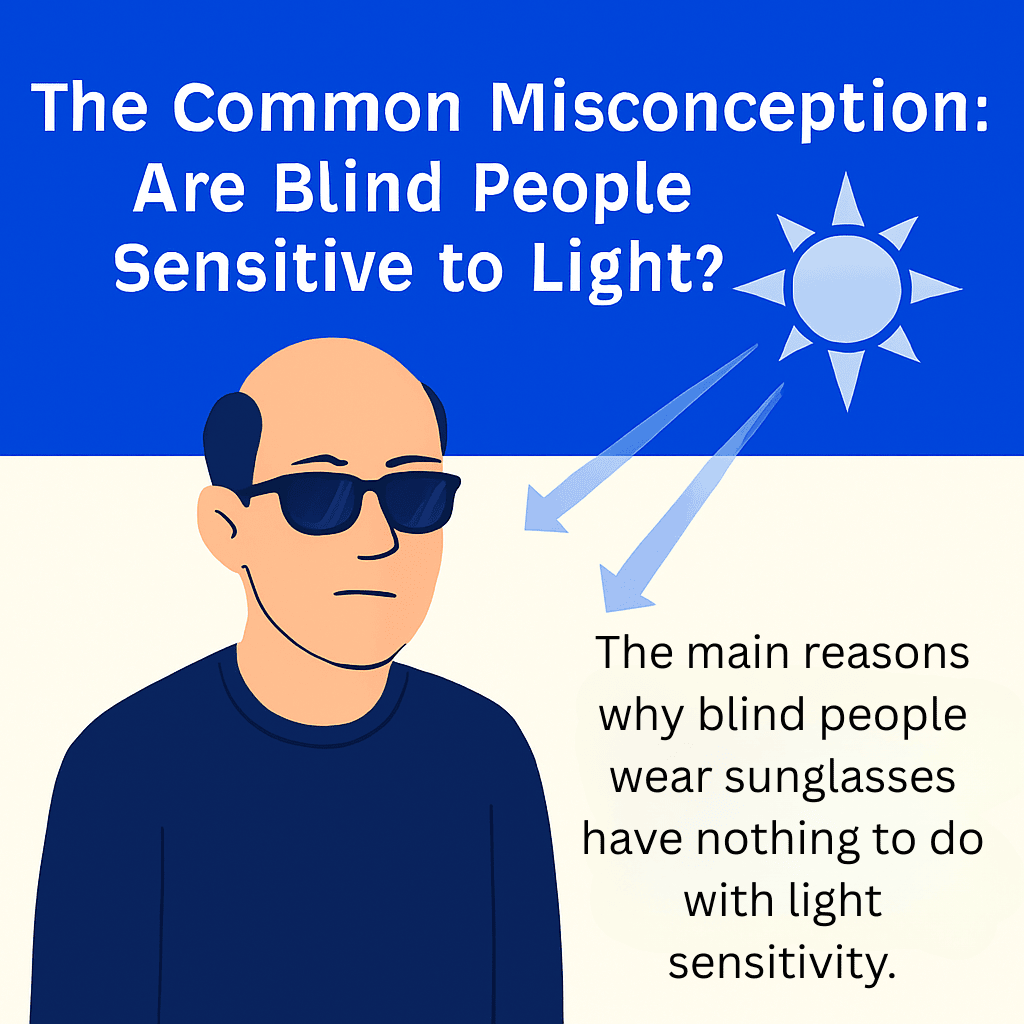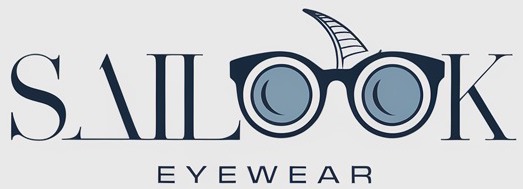Blind people wearing sunglasses may seem puzzling to many. It often raises the question: why would someone who can’t see need protection from the sun? In this article, we’ll explore the reasons behind this common practice, delving into the physical, psychological, and social benefits that sunglasses offer to blind individuals. We’ll address common misconceptions, provide clear insights into the challenges blind people face, and examine the various types of sunglasses that cater to their specific needs. Let’s unravel this together.

1. Why Do Blind People Wear Sunglasses?
What’s the real story?
Blind people wearing sunglasses may seem strange at first glance, but there’s more to it than meets the eye. While some may assume sunglasses are purely for those with vision, blind individuals face unique challenges that sunglasses can help address. One of the most common reasons is light sensitivity, a condition that many blind people suffer from, even if they can’t see. This light sensitivity, also known as photophobia, can make bright lights unbearably uncomfortable.
Sunglasses provide essential protection from light that might otherwise cause discomfort or even physical pain. Additionally, sunglasses offer a level of privacy and reduce social stigma. For people who are blind or have partial vision, being constantly stared at can be uncomfortable or overwhelming. Sunglasses serve as a protective barrier, helping them blend into social environments without drawing unwanted attention.
As we dig deeper into the practical uses of sunglasses for blind people, it’s important to note that they’re not just about blocking light. They also play a significant role in the daily lives of those affected by vision impairments. Let’s take a closer look at the key benefits.
| Benefit | Impact |
|---|---|
| Protection from light | Reduces discomfort from light sensitivity |
| Social privacy | Minimizes attention in public settings |
| Comfort and ease | Helps individuals navigate better |
2. What Are the Benefits of Sunglasses for Blind People?
Ready for the good part?
Sunglasses aren’t just about keeping out the sun—they serve multiple purposes for blind individuals. The first major benefit is protection from light sensitivity. Many people who are blind, particularly those with certain eye conditions like glaucoma or cataracts, experience heightened sensitivity to light, making it difficult to be in brightly lit spaces. For them, sunglasses act as a shield, reducing glare and discomfort.
Another important benefit is psychological. Wearing sunglasses helps protect a blind person’s privacy. In public, it’s common for others to stare when someone with a visual impairment is navigating or walking. Sunglasses give blind people a way to remain more anonymous, lessening the feeling of being constantly scrutinized. Social confidence can greatly improve when there’s less focus on one’s disability, helping them feel more like others around them.
In addition, sunglasses provide practical help when navigating unfamiliar environments. Even for people with light perception, sunglasses allow them to better manage their surroundings without being overwhelmed by sudden brightness. It’s a tool that helps them feel safer and more in control.
| Benefit | Explanation |
|---|---|
| Light protection | Shields against harmful light and glare |
| Privacy | Reduces social stigma and unwanted attention |
| Navigation assistance | Aids in managing lighting in public spaces |
3. Is It Just About Protecting Their Eyes?
What’s the real story?
It’s not just about protecting the eyes—sunglasses are essential for comfort, safety, and social integration for blind people. For instance, many blind people experience extreme discomfort from sudden changes in light. Without sunglasses, walking outside on a bright, sunny day could feel like an assault on their senses. By providing a physical barrier, sunglasses help blind individuals manage these environmental challenges and go about their day more comfortably.
Additionally, sunglasses can help to reduce the need for constant assistance when navigating through areas with harsh lighting. In public, it can be difficult to assess a person’s needs, and sunglasses help create an understanding—without them, someone might appear disoriented or distressed. With glasses, blind people can subtly communicate that they have a sensory challenge, fostering empathy and reducing frustration.
Sunglasses also play an important role in psychological well-being. Having the freedom to move through the world with the same confidence as anyone else, without worrying about the direct effects of sunlight or feeling alienated, can significantly improve their overall quality of life.
| Purpose | Impact |
|---|---|
| Environmental comfort | Eases light sensitivity and glare |
| Safety in public spaces | Reduces navigational challenges |
| Psychological well-being | Increases confidence and reduces stigma |
4. Do Blind People Have Vision-Related Issues Requiring Sunglasses?
This is where it gets interesting…
Not all blind people are completely blind. Many have partial vision or certain degrees of light perception, and this can be a key factor in their need for sunglasses. For individuals with partial vision, sunglasses help filter out bright lights and allow them to better manage their surroundings. People with conditions like macular degeneration or retinitis pigmentosa can still have some residual vision, and glare can make their remaining sight even more difficult to use effectively.
Glaucoma is another condition that often requires sunglasses. This disease causes intraocular pressure to rise, and sunlight can exacerbate the symptoms, including headaches and nausea. For these individuals, sunglasses help reduce the negative effects of sunlight, allowing them to feel more comfortable while out and about.
Overall, while many blind people do not have functional sight, sunglasses are still essential for managing light sensitivity, even for those with no vision at all. Their role extends beyond vision impairment—it’s about providing comfort, reducing glare, and enhancing quality of life.
| Condition | How Sunglasses Help |
|---|---|
| Partial blindness | Reduces glare for better visual comfort |
| Glaucoma | Protects against light sensitivity |
| Retinitis Pigmentosa | Helps with managing light exposure |
5. Can Blind People Still See Anything?
You might be wondering…
For many blind people, the answer is yes—they may have partial sight or light perception, but it varies from person to person. People with partial blindness might experience blurred vision or limited color perception, while others may see shadows or distinguish light and dark. For those with some level of light sensitivity, sunglasses help by allowing them to control the amount of light entering the eyes. This helps with orientation, navigation, and reducing visual discomfort.
In contrast, individuals who are completely blind do not perceive any light or images. However, even they benefit from sunglasses. For them, sunglasses are not a tool for improving sight, but rather a means of protecting the eyes from irritation due to exposure to bright environments, making their day-to-day experiences more comfortable and manageable.
| Sight Level | Sunglasses Impact |
|---|---|
| Partial blindness | Reduces glare and enhances residual sight |
| Complete blindness | Protects eyes from environmental light exposure |
6. How Do Sunglasses Help with Navigating the Environment?
What’s the real deal?
For blind people, navigating the environment is not always easy, especially in highly illuminated spaces or areas with reflections. Imagine trying to cross a busy street on a sunny day. The bright light can create confusion and disorient a blind individual, making it harder to determine the best route or judge where to go. Sunglasses alleviate this challenge, filtering out light that might otherwise obstruct their ability to use other cues, like sound or the layout of the environment.
Sunglasses also make walking in public spaces more manageable, helping individuals detect landmarks and navigate more confidently. They may not aid in seeing objects, but they contribute to an overall sense of control over their environment.
| Navigation Benefit | How Sunglasses Help |
|---|---|
| In bright sunlight | Reduces glare for safer navigation |
| Reflective surfaces | Prevents disorientation from glare |
| Public spaces | Helps with spatial awareness and movement |
7. Why Do Some Blind People Choose Not to Wear Sunglasses?
Here’s the kicker…
Not every blind person wears sunglasses, and there are various reasons why. For some, personal preference plays a large role. Some may find wearing glasses uncomfortable, especially if they already rely on other tools like canes or guide dogs to navigate. Others may feel that sunglasses draw unnecessary attention, which could make them feel more self-conscious.
Moreover, some individuals may not have severe light sensitivity and might feel that sunglasses are not necessary for their daily activities. Additionally, it’s worth noting that blind people have individual preferences and needs based on their specific experiences with vision impairment.
| Reason Not to Wear | Explanation |
|---|---|
| Comfort | May find sunglasses uncomfortable |
| Preference | Doesn’t experience significant light sensitivity |
| Attention | Feels self-conscious wearing glasses in public |
8. What Types of Sunglasses Do Blind People Prefer?
What’s the real story?
Blind people tend to prefer sunglasses with darker lenses that block out more light. Dark lenses are particularly helpful for those with photophobia, as they provide maximum protection from bright environments. Polarized lenses are also a popular choice. These lenses reduce reflections and provide a more stable visual experience by filtering light in specific orientations.
Custom sunglasses designed specifically for people with vision impairments can offer additional features, such as adjustable frames for comfort and UV protection. Sunglasses with photochromic lenses, which darken in response to sunlight, are another option that helps in adjusting to different lighting conditions.
| Sunglass Type | Feature |
|---|---|
| Dark lenses | Blocks out more light for comfort |
| Polarized lenses | Reduces reflections and glare |
| Custom designs | Offers tailored comfort and UV protection |
9. Are There Special Sunglasses Designed for Blind People?
This is where it gets interesting…
Yes, there are sunglasses designed specifically for blind people. These eyewear solutions cater to their unique needs, addressing everything from light sensitivity to privacy. Specialized sunglasses offer improved protection, especially in environments with fluctuating lighting conditions.
Some eyewear companies offer custom-made sunglasses designed for specific conditions, such as glaucoma or cataracts. These designs provide more durable frames, adjustable temples, and comfortable materials for all-day wear.
| Special Features | Benefit |
|---|---|
| Custom-made frames | Tailored to the specific needs of blind individuals |
| Durable materials | Ensures long-lasting use |
| Adjustable components | Provides comfort throughout the day |
10. How Do Sunglasses Impact Social Interactions for Blind People?
Ready for the good part?
Sunglasses can significantly improve social interactions for blind individuals. By wearing sunglasses, people who are blind can blend in better in public settings and feel less conspicuous. Without sunglasses, they might be subjected to unwanted attention or stares, which can be uncomfortable and isolating.
Sunglasses also serve as a social tool, helping blind people communicate without being the center of attention. It’s a subtle way to address their condition, reducing the likelihood of awkward or uncomfortable interactions. This promotes a sense of independence and self-confidence.
| Social Impact | How Sunglasses Help |
|---|---|
| Reduced unwanted attention | Helps blind individuals blend in |
| Increased confidence | Promotes social interaction with less stigma |
11. Is Wearing Sunglasses for Blind People a Psychological or Physical Need?
What’s the real deal?
For many blind people, sunglasses fulfill both psychological and physical needs. On the psychological side, wearing sunglasses helps to reduce stigma and boost confidence. It’s an emotional shield that helps them feel more confident in public spaces, without the feeling of being constantly observed.
On the physical side, sunglasses provide necessary light protection, reducing glare that can cause discomfort or physical symptoms like headaches. In public spaces, this can be essential to make the experience more tolerable, especially for those sensitive to bright or fluctuating lighting.
| Need Type | Impact |
|---|---|
| Psychological need | Helps reduce stigma and boost confidence |
| Physical need | Provides comfort by blocking harmful light |
12. Can Sunglasses Help Blind People with Eye Conditions?
This is where it gets interesting…
Yes, sunglasses can help blind people with specific eye conditions by offering both comfort and protection. For example, those with conditions like glaucoma, cataracts, or retinal degeneration often experience sensitivity to light. Sunglasses reduce glare, offering relief from the symptoms caused by these conditions. This makes it easier for people with eye conditions to manage their daily activities and navigate more comfortably.
Furthermore, UV protection is vital for people with certain eye conditions. Prolonged exposure to sunlight can worsen conditions like cataracts. Sunglasses with UV-blocking lenses help prevent further damage to the eyes, making them an essential tool for people with impaired vision.
| Eye Condition | Benefit of Sunglasses |
|---|---|
| Glaucoma | Protects against light sensitivity |
| Cataracts | Reduces glare and UV exposure |
| Retinal degeneration | Protects against environmental light damage |
13. Are Sunglasses a Fashion Statement for Blind People?
Here’s the kicker…
For some blind individuals, sunglasses aren’t just practical—they’re also a fashion statement. Just like anyone else, blind people enjoy expressing themselves through their clothing and accessories. Sunglasses can be a style choice, reflecting personal taste and enhancing one’s appearance.
In many cases, sunglasses are seen as a symbol of confidence, especially when worn with the intention of blending in or making a fashion statement. Sunglasses add a sense of flair, making them a part of their overall look. Whether they’re at a formal event or just out and about, sunglasses can help blind people feel empowered and in control of their image.
| Fashion Use | Benefit |
|---|---|
| Self-expression | Enhances personal style and appearance |
| Confidence | Helps blind individuals feel empowered |
| Stylish accessory | Adds flair and makes a statement |
14. What Should You Know About Choosing Sunglasses for Blind People?
What’s the real story?
Choosing sunglasses for blind individuals requires considering several key factors. First and foremost, light sensitivity is the primary concern. Sunglasses should have dark lenses to block out excess light and provide relief from glare. Polarized lenses can also be a great option, as they help reduce reflections from surfaces like water or pavement.
Additionally, sunglasses should be comfortable and durable. Since blind individuals may wear them throughout the day, it’s important to select frames that fit well and don’t cause discomfort. Adjustable components, like temples or nose pads, can be useful for achieving the perfect fit.
| Consideration | Why It Matters |
|---|---|
| Light protection | Reduces glare and discomfort |
| Comfort and durability | Ensures all-day wear without discomfort |
| Adjustability | Provides a personalized, secure fit |
15. Conclusion: How Can Sunglasses Improve Quality of Life for Blind People?
What’s the takeaway?
Sunglasses play a vital role in improving the quality of life for blind individuals. From providing physical comfort to offering a psychological boost, sunglasses are an essential tool for managing light sensitivity, navigating public spaces, and boosting confidence. They allow blind people to live more comfortably and independently, without constantly drawing attention or feeling alienated.
Whether it’s about protecting their eyes, enhancing their social experiences, or making a bold fashion statement, sunglasses provide more than just a practical solution—they offer a sense of normalcy and freedom. So, the next time you see a blind person wearing sunglasses, remember the deeper reasons behind it.
FAQ
Q1: What is the reason blind people wear sunglasses?
Sunglasses protect against light sensitivity, reduce glare, and provide privacy for blind individuals.
Q2: How do sunglasses help blind people with light sensitivity?
Sunglasses reduce discomfort caused by bright light and make it easier to navigate in sunny or brightly lit environments.
Q3: Are there special sunglasses for blind people?
Yes, there are custom-designed sunglasses that cater to the unique needs of blind individuals, such as those with light sensitivity or specific eye conditions.
Q4: Do all blind people wear sunglasses?
No, not all blind people wear sunglasses. Some may not need them, while others may prefer not to wear them for personal reasons.
Q5: How do sunglasses improve social interactions for blind people?
Sunglasses help reduce unwanted attention and increase confidence, making social interactions more comfortable and less stigmatizing.

